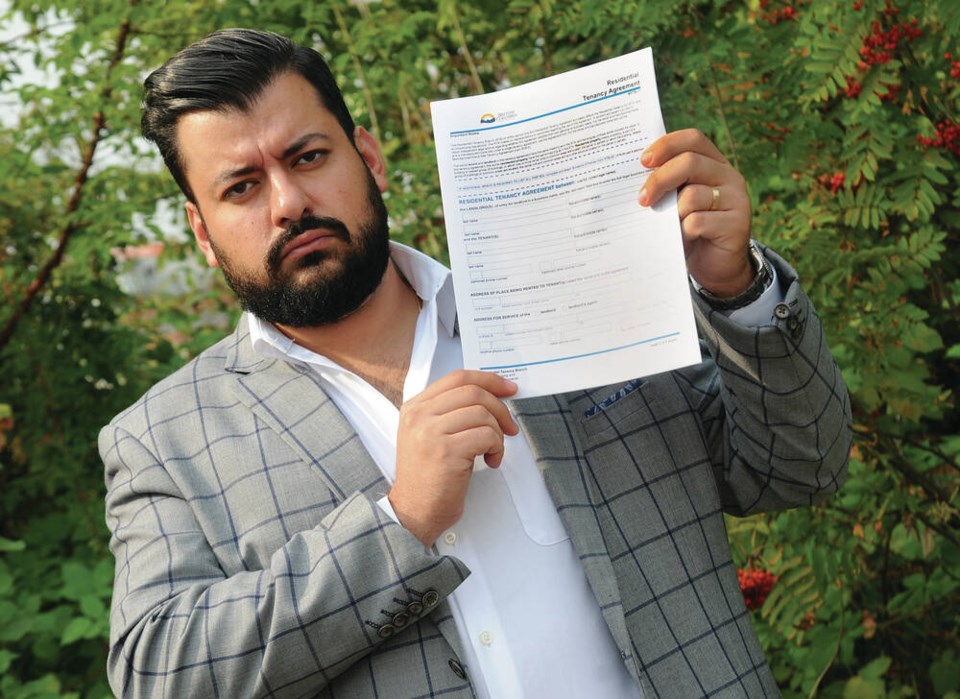A North Vancouver landlord says lengthy delays at the B.C. Residential Tenancy Office have left him with no recourse after his tenants stopped paying rent shortly after moving into his Deep Cove property.
Now, Araz Ounchi says he is draining his savings and being put in severe financial stress because he has no legal way to evict his tenants while they wait five months for a hearing.
By the time his hearing before the residential tenancy office takes place, Ounchi said he’ll be owed more than $30,000 – money he says it’s unlikely he’ll get back.
“I have a huge mortgage on [the property]. And with the interest rate hikes, it’s going up,” he said.
Ounchi said he accepts the law is in place to protect both landlords and tenants. But the lengthy delays are making the system unmanageable, he says.
Some other landlords he knows are facing similar problems, he said.
Ounchi says that situation is making him think twice about renting out residential property in future – which isn’t good for anyone.
Ounchi said his tenants moved into the 35-year-old North Vancouver home in May after he’d checked references and both he and his tenants had signed a one-year lease. But they stopped paying rent the following month. Ounchi said he tried to talk to the tenants, then gave them an eviction notice, which they immediately disputed.
Landlord faces five-month wait for hearing
“And the landlord in this position, can’t do anything until the hearing date. And even after the hearing, there’s no guarantee they will get their rent,” he said.
In Ounchi’s case, he was told in July the hearing wouldn’t take place until November and that a decision would likely follow some weeks after.
Ounchi said he was told the lengthy delay was because the residential tenancy office is facing a huge backlog of applications that has pushed all but the most urgent cases onto a months-long waiting list.
“So basically, in this whole six-month period, there’s nothing I can do,” he said.
Ounchi isn’t alone in his frustration.
Several similar complaints received by MLA's office
A staffer at North Vancouver Seymour MLA Suzie Chant’s office said they’ve received several complaints about lengthy delays for tenancy hearings, starting this summer.
Local MLAs have passed those concerns on to the ministry, he said, which is “very aware of this issue.”
But unfortunately, “There’s no instant fix.”
According to a spokesman at the Ministry of Attorney General and Responsible for Housing, the volume of applications received by the Residential Tenancy Branch has shot up dramatically this year. Currently the branch is receiving over 1,800 applications each month compared to about 1,500 applications between 2018-2021, he said. That has resulted in the process to get to a hearing taking longer.
Wait time for regular disputes is almost 16 weeks
As of this summer, the average wait time for a regular dispute was almost 16 weeks – up from an average of six weeks in March 2020.
“We appreciate the frustration of tenants and landlords,” he said, “including those who may be dealing with tenants who may take advantage of these delays to continue to stay in the unit.”
“Emergency issues” such as a need for emergency repairs to a rental suite, are prioritized first. Those can be heard in about four weeks currently.
David Hutniak, chief executive officer of LandlordBC, said the wait for hearings is a significant challenge for both landlords and tenants – and one his organization has repeatedly raised with government.
'Unacceptable delays'
Lack of staff at the residential tenancy office has meant “extensive and unacceptable delays,” said Hutniak, with small landlords being hit the hardest.
Robert Patterson, a lawyer with the Tenant Resource and Advisory Centre, says those delays are also hurting tenants who have urgent issues to resolve, such as those who get illegally locked out of their suite by a landlord. “People are still having to wait a month or two,” he said. “There’s a lack of resources in the branch.”
Ounchi said as a landlord he doesn’t feel he gets the same consideration as a tenant from the branch.
“If there’s an issue with the property, I’m expected it to fix the issue right away, right? If the roof is leaking, it won’t go for six, seven months, it will be dealt with right away,” he said.
Ounchi said other landlords he knows are considering switching from residential to commercial property investment, so they don’t have to deal with the Residential Tenancy Office.
“When something like this happens now, I don’t even know how I’m able to trust the next tenant coming in,” he said. “I feel like there’s no support for landlords.”



